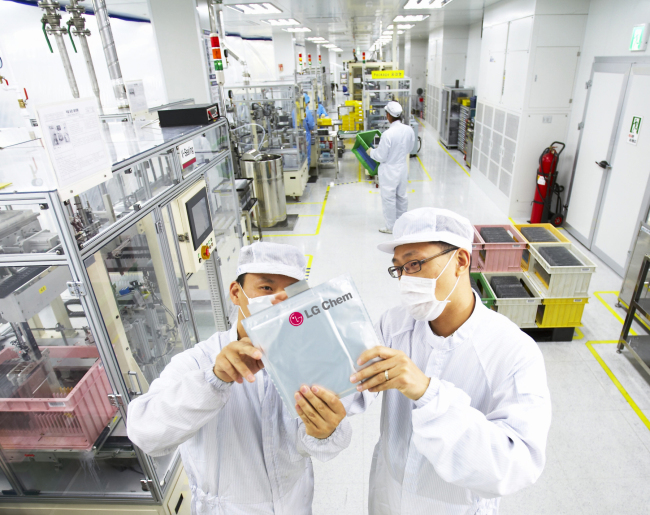LG Chem said Wednesday that it had clinched a deal to supply lithium-ion batteries to Germany-based premium automaker Audi for its next-generation electric automobiles.
The materials and battery giant said the deal could pave the way for the company to supply its batteries to other auto units of Volkswagen Group as some share automobile platforms to manufacture cars.
Its batteries, for instance, could be used in the Audi A3 E-Tron and Volkswagen e-Golf as they share the same platform for the hatchbacks, industry sources noted.
Audi, Bentley, Porsche, Skoda, Lamborghini and Volkswagen operate under Volkswagen Group, which aims to become the world’s biggest electric car maker by 2018. LG Chem also seeks to become the No. 1 maker of mid- to large-size electric batteries by 2018.
 |
LG Chem engineers inspect a battery cell at the firm’s plant in Ochang, North Chungcheong Province. (LG Chem) |
Volkswagen Group CEO Martin Winterkorn said last year that the group seeks to generate 3 percent of its total revenue from electric cars in the next four years.
Given that Volkswagen sold nearly 10 million units last year, LG Chem said its new auto partner could manufacture and sell 300,000 electric cars in the same period.
The Korean company’s 48V lithium-ion batteries will be used in Audi’s new plug-in hybrid and micro-hybrid vehicles.
The 48V batteries, which will be replacing conventional automotive lead-acid batteries, can improve the cars’ fuel efficiency, LG Chem noted.
The latest deal with Volkswagen will further boost LG Chem’s efforts to be recognized as a global leading battery maker. It also supplies to five other top 10 global automakers: GM, Ford, Renault-Nissan, Hyundai Motor and Kia Motors.
“Although we have successfully sealed supply deals with top automakers since we started producing mid- to large-size electric batteries 10 years ago, we must continue going forward to become the solid No. 1,” said LG Chem president Kwon Young-soo.
LG Chem has been zeroing in on its battery and materials businesses to make up for a slowdown in petrochemicals amid a global shale gas boom.
By Park Hyong-ki (
hkp@heraldcorp.com)








